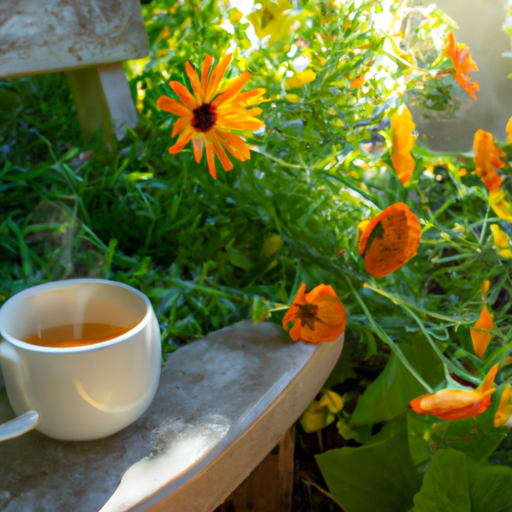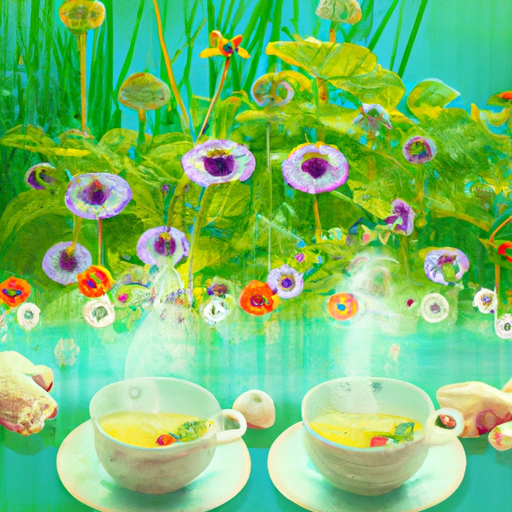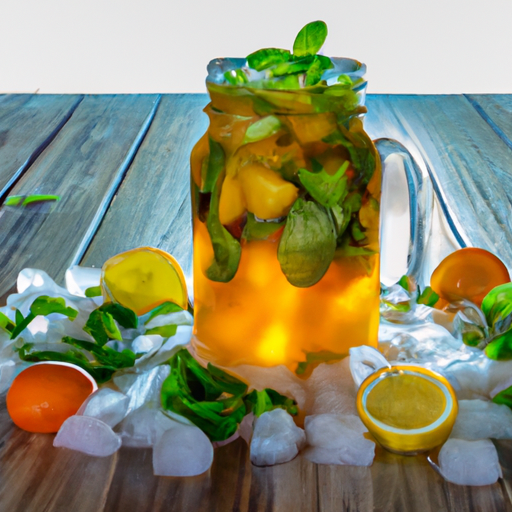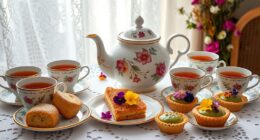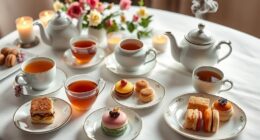As someone who loves tea, I make it a point to savor a delicious and fresh cup of herbal tea whenever I can. But what happens when life gets hectic and I can’t brew all my preferred tea leaves immediately? This leads to the question: how long can I keep dry herbal tea leaves stored?
Let me share a case study to illustrate the importance of understanding the shelf life of tea leaves. Imagine you recently purchased a delightful batch of chamomile tea leaves from a local artisanal tea shop. You savor the delicate floral notes in each cup, but soon you realize that you won’t be able to finish the entire package in a short period.
In this article, we will explore the factors that affect the freshness and flavor of tea leaves, as well as proper storage techniques to extend their shelf life. We will also discuss the signs that indicate your tea leaves have gone bad and provide tips for maximizing their freshness and flavor.
Additionally, we’ll delve into creative ways to repurpose expired tea leaves, ensuring that no leaf goes to waste. So, let’s dive in and discover the secrets to storing dry herbal tea leaves effectively!
Key Takeaways
- Understanding the shelf life of dry herbal tea leaves is crucial for ensuring their freshness and flavor.
- Factors such as proper storage techniques and different storage methods can significantly impact the shelf life and flavor of tea leaves.
- Signs of tea leaves going bad include a stale or musty smell, loss of aroma, and a change in color or appearance.
- To maximize the freshness and flavor of tea leaves, it is important to store them in airtight containers, away from moisture, heat, and light.
Understanding the Shelf Life of Dry Herbal Tea Leaves
When it comes to dry herbal tea leaves, it’s important to understand their shelf life and how long they can be stored. To extend the shelf life of dry herbal tea leaves, there are a few key things to consider.
First, proper packaging is crucial. Tea leaves should be stored in airtight containers, away from light, heat, and moisture. This helps to maintain their freshness and flavor for longer periods of time. Additionally, if you buy tea leaves in bulk, it’s a good idea to transfer them to smaller containers to minimize exposure to air. This will help prevent the tea leaves from becoming stale.
By following these simple steps, you can ensure that your dry herbal tea leaves stay fresh and flavorful for as long as possible.
Now, let’s explore the factors that affect the freshness and flavor of tea leaves.
Factors that Affect the Freshness and Flavor of Tea Leaves
To maintain the optimal freshness and flavor of your tea, you’ll want to consider various factors. One of the most important factors is the shelf life of tea leaves. The shelf life can vary depending on the type of tea and the storage methods used. Proper storage techniques play a crucial role in preserving the flavor of tea leaves.
Here is a table that highlights the impact of different storage methods on tea flavor:
| Storage Method | Impact on Tea Flavor |
|---|---|
| Air-tight container | Helps retain freshness |
| Exposure to sunlight | Degrades flavor |
| Moisture exposure | Causes mold and spoilage |
| Temperature fluctuations | Accelerates flavor loss |
| Strong odors nearby | Absorbs unwanted scents |
By understanding these factors, you can ensure that your dry herbal tea leaves stay fresh and flavorful for longer periods. Now, let’s explore the proper storage techniques for dry herbal tea leaves.
Proper Storage Techniques for Dry Herbal Tea Leaves
By utilizing the right storage techniques, you can create a cozy haven for your favorite herbal infusion, ensuring it remains a delightful and aromatic treat. To keep your dry herbal tea leaves fresh and flavorful, here are some best practices for proper storage:
-
Use proper storage containers: Opt for airtight containers, such as glass jars with tight-fitting lids, to protect your tea leaves from moisture, light, and air exposure.
-
Avoid exposure to heat and sunlight: Store your tea leaves in a cool, dark place, away from direct sunlight and heat sources, as these can degrade the flavor and quality.
-
Keep away from strong odors: Tea leaves can absorb strong odors, so store them away from spices, coffee, or other strong-smelling substances.
By following these storage techniques, you can prolong the freshness and flavor of your herbal tea leaves.
Now, let’s explore the signs that your tea leaves have gone bad.
Signs that Your Tea Leaves have Gone Bad
Storing your favorite herbal infusion properly is essential to maintain its freshness and aroma, but it’s also important to be aware of the signs that indicate your tea leaves have spoiled. Paying attention to these warning signs can help you avoid potential health risks.
One of the first signs to look out for is a change in color. If your tea leaves have turned dark or developed spots, it’s a clear indication that they’ve gone bad.
Another warning sign is a pungent or sour smell coming from the leaves. This could be a sign of mold or bacterial growth.
Additionally, if you notice any signs of moisture or clumping, it’s time to discard the tea leaves.
By being mindful of these warning signs, you can ensure that you always enjoy a fresh and flavorful cup of tea.
Moving on to the next section, let’s explore some tips for maximizing the freshness and flavor of tea leaves.
Tips for Maximizing the Freshness and Flavor of Tea Leaves
One interesting statistic to grab the audience’s attention is that properly storing tea leaves can help maintain their freshness and flavor for up to six months. To maximize the freshness and flavor of tea leaves, here are some tips:
- Store tea leaves in airtight containers to prevent exposure to air and moisture.
- Keep tea leaves away from direct sunlight, as it can degrade their quality.
- Store tea leaves in a cool and dark place, such as a pantry or cupboard.
- Avoid storing tea leaves near strong-smelling substances, as they can absorb odors.
- Use tea leaves within the recommended time frame for the best flavor.
By following these tips, you can extend the shelf life of your tea leaves and preserve their aroma.
So, what can you do with expired tea leaves? Let’s explore some creative ways to use them in the next section.
Creative Ways to Use Expired Tea Leaves
Looking to add a unique twist to your culinary creations? Get ready to discover some ingenious ways you can transform those expired tea leaves into culinary masterpieces. Don’t throw away those old tea leaves just yet! Instead of using them for a brew, consider these alternative uses.
Firstly, you can infuse the flavor of the tea leaves into butter or oil to create a delicious base for cooking or baking. Simply melt the butter or heat the oil gently with the tea leaves and strain before using.
Secondly, you can use the leaves as a seasoning or rub for meats and vegetables, giving them an aromatic and distinct taste.
Lastly, you can incorporate the tea leaves into DIY crafts, such as homemade scented candles or potpourri. The possibilities are endless!
Now, let’s delve into some FAQs about storing dry herbal tea leaves.
FAQs about Storing Dry Herbal Tea Leaves
After discovering the many creative ways to use expired tea leaves, I started wondering about the best way to store dry herbal tea leaves. As a tea enthusiast, I want to make sure I can enjoy the freshness and flavor of my favorite teas for as long as possible. So, I did some research and found some frequently asked questions about storing loose leaf tea. Here are some key tips on how to extend the shelf life of tea leaves:
- Keep the tea leaves in an airtight container to prevent moisture and air from getting in.
- Store the container in a cool, dark place, away from sunlight and strong odors.
- Avoid storing tea leaves in the refrigerator, as this can introduce excess moisture.
- Consider using vacuum-sealed bags or jars for even better preservation.
By following these simple guidelines, you can ensure that your dry herbal tea leaves stay fresh and flavorful for an extended period.
Frequently Asked Questions
Can I still use tea leaves that have gone past their expiration date?
Yes, you can still use tea leaves past their expiration date in cooking. However, for skincare purposes, fresh tea leaves are recommended due to their higher potency and effectiveness in providing beneficial antioxidants and nutrients.
What is the best way to store tea leaves to retain their freshness?
To retain the freshness of tea leaves, it’s important to store them in the best containers, such as airtight jars or tins. Humidity can adversely affect their flavor and aroma, so it’s crucial to keep them in a dry environment.
Can I store different types of tea leaves together in the same container?
Yes, you can store different types of tea leaves together in the same container. However, to maintain freshness, it’s important to store tea blends separately from pure teas and ensure that the container is airtight.
Can I freeze tea leaves to extend their shelf life?
Oh, absolutely! Freezing tea leaves is a fantastic idea if you want them to last forever. And don’t bother with alternative methods of tea storage, because freezing is definitely the way to go.
How can I tell if my tea leaves have gone bad?
To revive stale tea leaves, try steeping them in hot water for a longer period of time or adding a pinch of fresh leaves to enhance the flavor. Signs of oxidation in tea leaves include a dull color, musty aroma, and a bitter taste.
Conclusion
In conclusion, my fellow tea enthusiasts, remember that like a delicate flower, the freshness and flavor of dry herbal tea leaves can wither away over time. By understanding the factors that affect their shelf life and employing proper storage techniques, we can savor the exquisite taste and aroma they offer for longer.
Don’t let your tea leaves go bad and lose their magic. Instead, take heed of the signs and use these tips to keep them vibrant and full of life.
Let’s embark on a journey of delicious tea experiences, where every sip is a delight to our senses.



